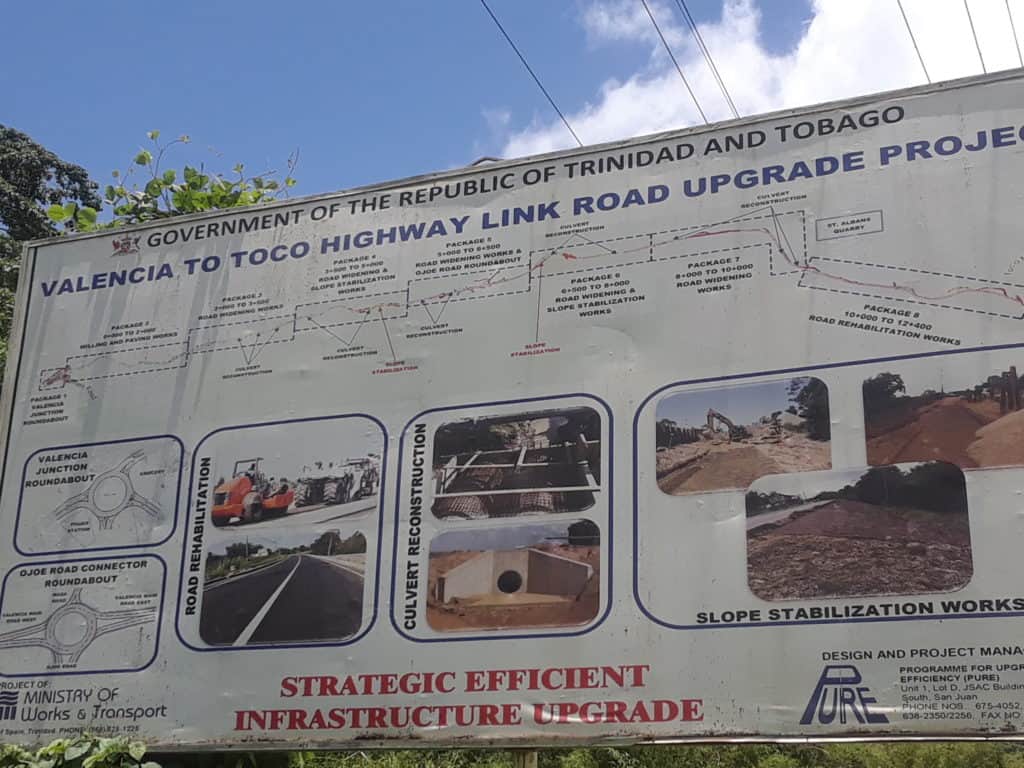Some of us know all too well, the issues around the Valencia to Toco Roadway and development plans for the northeast region. After all, proposed projects for the region have been in the news for over 20 years! So, let’s look at some of these developments and their impact on surrounding communities.
With construction underway since 2019, the Toco highway is moving full speed ahead. Beginning at the Valencia mile-mark, there is already evidence of much-needed culverts, drains, road-widening and re-paving. These are all welcome initiatives since it’s an everyday nightmare for those who make the daily commute: working folk, farmers, fishermen and shop keepers needing fresh stock. However, one major issue for residents is that the highway is designed to veer away from villages like Matura and Cumana which could be severely impacted by this detour.
Businesses that normally thrive on the steady flow of visitors stopping to make small purchases of everything from vegetables, boiled corn and fruits such as balata, sugar apple and chenette to fish and more are fearful about losing their market when the highway opens. The lone gas station between Valencia and Toco and the main turtle-watching attraction at the Matura Nature Center which attracts hundreds of visitors each year will also be left out in the cold. While the old Toco Main Road remains available for those wishing a more scenic route, the addition of a ‘faster highway route’ could entice holidaymakers and undermine the already fragile livelihood for communities along the traditional route.

On its Facebook page National Infrastructure Development Company, NIDCO, the state enterprise responsible for the project planning, states that one of its project objectives is “to improve accessibility to the proposed Toco port and northeast area in general and… encourage development in surrounding communities”. One assumes that NIDCO would have done the required due diligence in securing the necessary environment protocols and consultations with regional councillors and other stakeholders. However, given the number of questions that remain unanswered, one must wonder to what extent its consultations incorporated the inputs of Toco residents.
For example, will the construction of connector roads from the highway offer new alternatives for local entrepreneurship that will attract more visitors while maintaining the region’s indigenous character?
Who will provide the infrastructure for sustaining eco-friendly activities such as hiking, kayaking and nature trails?
What are the plans for responding to the increased demand for water and electricity that will result from heavier traffic of visitors and migrants to the area?
Despite the planners’ many claims of progress and community development, several voices have joined the chorus for sustaining the region’s cherished eco-system . Such voices include local and international environment consultants, local interest groups like SAD (Stakeholders Against Destruction) for Toco, Totally Toco and Friends and Fishermen of the Sea (FFOS). Research studies like The Sangre Grande Municipality, Local Area Economic Profile, and SAD also reinforce the value of utilising the region’s biodiversity as opportunities for the development of the region.
The roadway like other development plans for the northeast, should not merely be one of mere concrete and gravel but a pathway for collaboration, shared ideology, and shared leadership to the benefit of all. Given the harsh economic realities of the Covid-19 era, planners can scale down large planning projects like this and consider using more “citizen science” as one environmental professional calls it. This would mean engaging the community and listening to the voices of the people who utilise the area daily. No one could more intimately understand the needs of the people of Toco and the neighbouring communities than those who stand as community gatekeepers and guardians of the natural heritage.





